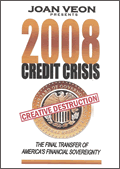WHAT IS THE ROLE OF IRAN?
PART 4
By
Dennis L. Cuddy, Ph.D.
April 20, 2009
NewsWithViews.com
[NOTE: Who said the following? “This state of mind, which subordinates the interests of the ego to the conservation of the community, is really the first premise for every truly human culture…. The basic attitude from which such activity arises, we call – to distinguish it from egoism and selfishness-idealism. By this we understand only the individual’s capacity to make sacrifices for the community, for his fellow men.” Doesn’t this sound like the Communitarian philosophy of today? Actually, it was Hitler who wrote the quoted words in Mein Kampf (July 18, 1925). Further relevant to what is occurring today, Leonard Peikoff in Ominous Parallels (1982) wrote: “Contrary to the Marxists, the Nazis did not advocate public ownership of the means of production. They did demand that the government oversee and run the nation’s economy.
The issue of legal ownership, they explained, is secondary; what counts is the issue of control. Private citizens, therefore, may continue to hold titles to property – so long as the state reserves to itself the unqualified right to regulate the use of their property…. But the Nazis defended their policies, and the country did not rebel; it accepted the Nazi argument. Selfish individuals may be unhappy, the Nazis said, but what we have established in Germany is the ideal system, socialism. In its Nazi usage this term is not restricted to a theory of economics; it is to be understood in a fundamental sense. ‘Socialism’ for the Nazis denotes the principle of collectivism as such and its corollary, statism – in every field of human action, including but not limited to economics. ‘To be a socialist,’ says Goebbels, ‘is to submit the I to the thou; socialism is sacrificing the individual to the whole.’”]
The British “Power Elite” (PE) members didn’t like any strong national leaders. These included Egypt’s Gamal Abdal Nasser (who nationalized the Suez Canal on July 26, 1956) and Iran’s Mohammad Mossadegh, who nationalized that country’s oil industry at the expense of the British. In Pulitzer Prize-winning journalist Ben Bagdikian’s The Media Monopoly, one reads about “when Kermit Roosevelt, a former Central Intelligence Agency (CIA) officer, wrote a book called Countercoup: The Struggle for the Control of Iran. It was the author’s inside version of how intelligence agencies overthrew a left-leaning Iranian premier, Mohammad Mossadegh, in 1953 and reinstated the Shah. The issue was control of oil. The plot was called ‘Ajax,’ of which Roosevelt wrote: ‘The original proposal for Ajax came from the Anglo-Iranian Oil Company (AIOC) after its expulsion from Iran nine months earlier.’ The book was published by McGraw-Hill in early 1979. Books were on sale in bookstores and reviewer copies were already in the mail when British Petroleum, successor corporation to AIOC, persuaded McGraw-Hill to recall all the books – from the stores and from reviewers.”
As I indicated in Part 3 of this series, the British PE Milner Group didn’t want a strong Israel. Thus, during the Carter administration, according to Morton Klein, Secretary of State Cyrus Vance (member of Yale University’s secret society Scroll & Key) “once revealed that if Carter had won a second term, he intended to sell Israel down the river.”
Today, the PE uses the terrorist acts of radical Muslims against Israel as a means of pressuring Israelis to make compromises that will lead to an eventual acceptance of a World Socialist Government. I’ve quoted in the past Lincoln Bloomfield’s Study Memorandum No. 7 for Rhodes scholar Secretary of State Dean Rusk in 1962: “If the communist dynamic was greatly abated, the West might lose whatever incentive it has for world government.” So just substitute the words “radical Muslim” for “communist” and “Israel” for “the West,” and you will understand the PE’s mechanism at work today.
But it’s not as though no Israeli could anticipate the future, because Look magazine (January 16, 1962) published Israeli Prime Minister David Ben-Gurion’s prediction of what the world would look like in 25 years: “The Cold War will be a thing of the past… a gradual democratization of the Soviet Union…. On the other hand, the United States [will be transformed] into a welfare state with a planned economy. Western and Eastern Europe will become a federation of autonomous states having a Socialist and democratic regime. With the exception of the USSR as a federated Eurasian state, all other continents will become united in a world alliance, at whose disposal will be an international police force…. A pill to prevent pregnancy will slow down the explosive natural increase in China and India….”
Concerning U.S. support for radical Muslims like Ayatollah Khomeini in Iran and the Taliban in Afghanistan, on July 3, 1979 President Carter signed a directive approving covert aid to anti-Soviet fighters in Kabul. And Carter’s National Security Advisor Zbigniew Brzezinski (ZB) told The Guardian reporters David Leigh and Richard Norton-Taylor (“House of Saud Looks Close to Collapse,” November 21, 2001), “that the Russians had been drawn into what he saw as his cleverly baited trap. The day the Soviet forces crossed the border [into Afghanistan] he wrote to Carter, saying: ‘We now have the opportunity to give the USSR their Vietnam War.’” Often unreported about this chapter in U.S. history is the role of China, but Mike Evans in his new book, Jimmy Carter: The Liberal Left and World Chaos, points out that in January 1980, Secretary of Defense Harold Brown “was able to secure permission for U.S. supply planes to traverse Chinese air space on flights to arm the Afghan Mujahadeen. Soon thereafter, and despite China’s history of ignoring human rights issues, Congress conferred upon the Chinese government the status of most-favored-nation. The U.S. agreed to sell specific technological materials that had both military and civilian uses.”
When asked later about the wisdom of supporting radical Muslims, ZB reportedly said: “What is more important in world history? The Taliban or the collapse of the Soviet empire? Some agitated Moslems or the liberation of Central Europe and the end of the Cold War?” (See Blowback: The Cost and Consequences of American Empire by Chalmers Johnson.)
|
Subscribe to the NewsWithViews Daily News Alerts! |
“Some agitated Moslems”?! According to Clare Lopez of The Centre for Counter Intelligence and Security Studies, Iran’s Ministry of Intelligence and Security (MOIS, also known as VEVAK, Vezarat-e Ettela’at va Amniat-e Keshvar) was involved in the 1996 attack on Khobar Towers in Saudi Arabia (19 Americans killed), the 1998 East African Embassy bombings, and the October 2000 attack (by Al Qaeda) on the USS Cole. VEVAK was also involved in the 1983 bombings of the U.S. Embassy in Beirut, about which the U.S. had foreknowledge! According to CIA agent Robert Baer in See No Evil (2002), he saw “an intelligence report from March 1982 – a full 13 months before the Embassy bombing – stating that Iran was in touch with a network capable of destroying the U.S. Embassy in Beirut. A subsequent report even specified a date the operation should be carried out. The source was firsthand and its validity rock solid.” Ask yourself why the U.S. would allow its Embassy to be bombed when it had foreknowledge of the attack.
Click here for part -----> 1, 2, 3, 4,
� 2009 Dennis Cuddy - All Rights Reserved















